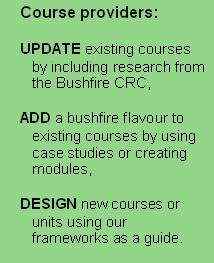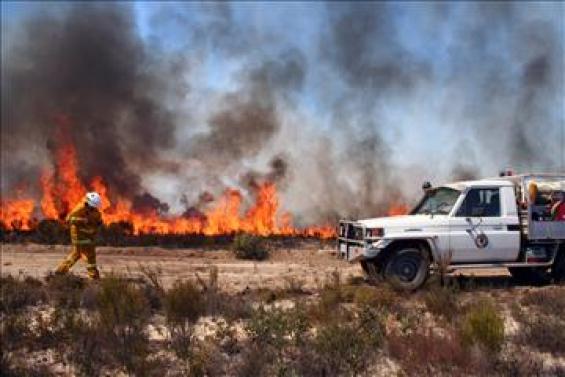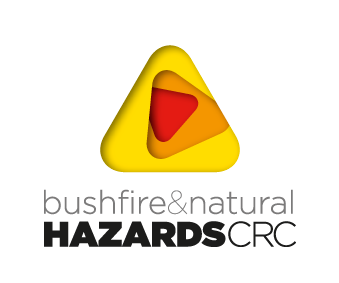Emergency and Risk Management
 The key agencies involved in bushfire emergency management - the rural and urban fire services, state land management agencies and state emergency services - all have well established in-house training programs to build employee and volunteer capacity.
The key agencies involved in bushfire emergency management - the rural and urban fire services, state land management agencies and state emergency services - all have well established in-house training programs to build employee and volunteer capacity.
These organisations have a strong culture and dependency on volunteers. Because of the "life and death" nature of the job, training needs to be rigorous and defendable. Most agencies train people for particular job functions and award units of competence from the Public Safety National Training Package.
While land management agencies might typically recruit university graduates , employees in the fire services and emergency services sector are more likely to have risen through the ranks without having academic qualifications. However, they bring considerable context-specific training related to fire fighting and management operations.
What role does higher education have in emergency management education for this sector? Agencies and fire services have identified education gaps in middle management. There is a need for the development of generic management capacities alongside context specific skills.
The following diagram shows seven key perspectives that a course designer might consider in developing well grounded understandings and skills in relation to emergency management, particularly in relations to the management of bushfire. These perspectives aim to give a sense of the whole, rather than be clearly demarcated categories.

Using the framework
There are a range of risk management perspectives that will be important in different types of courses. For example, a business lecturer might have an interest in reviewing the implications of emergencies for risk management for different organisations.
Managers of emergency organisations also need particular skills in human resource management and team leadership and development, as well as business continuity in times of crisis.
A lecturer in emergency management is likely to draw on all seven perspectives to provide students with the necessary skills needed in emergency planning, preparation, response, recovery and research. A curriculum developer interested in emergency management leadership will find the resources available on team leadership and development valuable.
Potential Students
Undergraduate Students
Pre-employment
These students are preparing for challenges that they need to face in the next 5 to 10 years in which their prospective employers will expect them to have the skills to meet. They are interested in working in areas of Emergency Services, Occupational Health and Safety and Risk Management, some of which may involve management of bushfire risk. They need to gain principled understandings that are transportable across states.
Undergraduate Students
Currently employed in emergency services sector
Recognised Prior Learning - units of competencies in the Public Safety Training Package
These people are likely to be looking for qualifications (Degrees or Associate Degrees) which help them develop skills for middle management positions in the fire services and state emergency services sectors. They are likely to have "come through the ranks" with in-house training programs that have been acredited against the Public Safety Training Package. They are unlikely to consider themselves as "academic" and are looking for courses which recognise their prior learning and which are tailored to suit their learning styles and their future job needs.
Graduates
Professionals
Grad Cert / Grad Dip / Masters Emergency or Risk Management
These professionals already have undergraduate degrees from a variety of backgrounds, for example environmental sciences. They are interested in gaining Grad Cert, Grad Dip or Masters qualifications in Emergency or Risk Management to help build specific job-related skills. For example they might be employed in the land management agencies and required to take on strategic planning or incident management related to wildfires. They may bring Recognised Prior Learning from the Public Safety National Training Package.
Bushfire Consultants
This is a growing group of people who provide advice to building surveyors, architects, planners, householders, local government and communities. They need to be accredited with the Fire Protection Association of Australia (FPAA). They have varying backgrounds - many coming from fire services and some with environmental, planning or surveying backgrounds. This group are likely to be interested in building their capacity where they have gaps in their previous experience.



